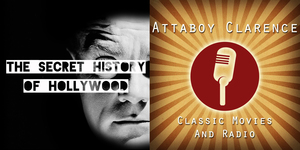"I say, Digges, you don't suppose I've aroused her slap-me-again-I-love-it complex?"
Teaming up for a third time, after Of Human Bondage and The Petrified Forest, Leslie Howard and Bette Davis here let off steam with a delightful comedy based on the story 'Gentlemen After Midnight' by Maurice Hanline.
Egotistical lothario, Basil Underwood (Leslie Howard) is a star of the stage, often appearing opposite his on-off fiancee, Joyce Arden (Bette Davis). Although they're deeply in love, they're constantly tearing chunks out of each other on and off the stage, mainly due to Basil's philandering ways. After breaking their engagement for the eleventh time, Basil decides to reform, to put his skirt-chasing days behind him and turn over a new leaf, but can't decide on how to go about it.
When he's visited by Henry Grant (Patric Knowles), whose fiancee, Marcia West (Olivia de Havilland) has fallen desperately in love with Underwood after having seen him in 'Romeo and Juliet', Basil has an epiphany. He conspires with Grant to travel down to the West's country home as their guest, whereupon he will make such a jackass out of himself that Marcia's feelings for him will evaporate, thereby redeeming his debauched soul, and earning the love of Joyce.
Accompanied by his long-suffering man-servant, Digges (Eric Blore), Underwood flies into the task with aplomb, but the path to righteousness is never easy, and soon his old ways begin to surface once more.
The sight of Howard playing such a self-important, swaggering bastard is a rare one. Usually playing in roles that emphasise the gentler, more sensitive side of man, it's therefore a treat to see him break ranks in such bombastic style. He's wonderful as Basil Underwood, a combination of Bertie Wooster and Clifton Webb's Mr Belvedere.
Davis, unfortunately, has rather a thankless role as the shrewish Joyce. A couple of her barbs land squarely in the seat of the pants, but mainly she's there to bookend the movie, yelping at Howard every time she catches him in a clinch.
Olivia de Havilland has a rather more interesting role as Marcia (indeed, Davis even coveted the role before being cast as Joyce) as the lovestruck ingenue, impervious to Howard's swine-like behaviour. At 21, she's luminously beautiful in the role, and it's clear to see why the world was about to fall at her feet.
The real star of the film, however, is Eric Blore, who should have been arrested on grand larceny charges for stealing so many scenes here. His put-upon Digges is the perfect foil to Underwood, at once in love with the man he serves, and yet thoroughly exasperated at the man's arrogance. His scene at the breakfast table, where he feigns offence at the prospect of a breakfast without kippers is truly hilarious, as is the wink he throws at Henry on the way out.
In fact, the whole movie is genuinely funny as a result of the teaming of Howard and Blore. They're the perfect match for each other, their timing impeccable, their countenances stoic as they follow through with their killingly-funny, yet doomed plot, aided no end by a razor sharp script, and deft direction by Archie Mayo. It's a gem of a movie, a real overlooked classic that'll brighten your whole year should you stumble across it.





